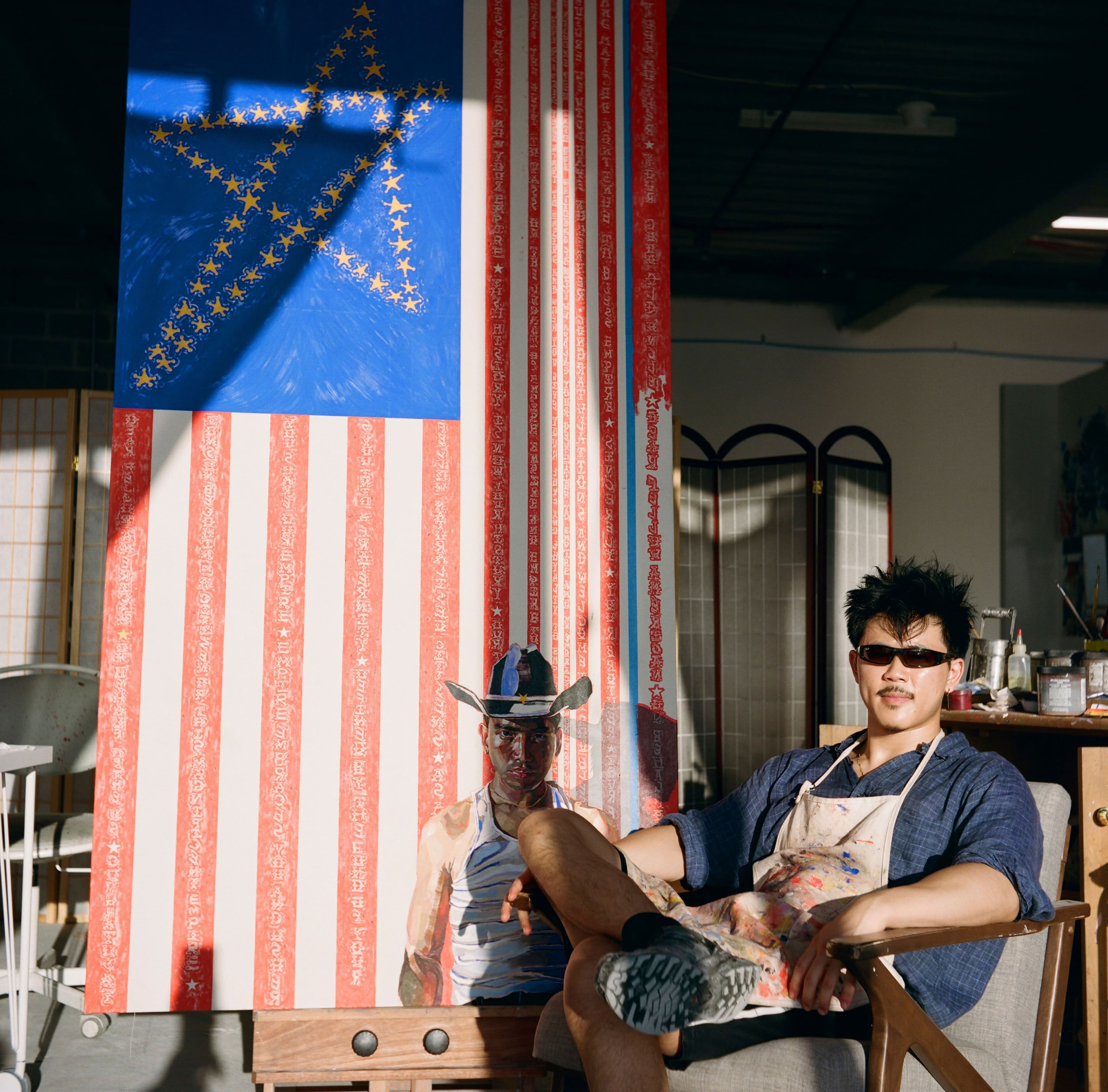
Oscar yi Hou in his studio, 2022. Photography by Hannah Wyatt.
The Unknowable Subjects of Oscar yi Hou
Today’s young painters find themselves faced with many of the same issues as their daring predecessors centuries before them. While avant garde artists have always taken liberties to represent the world around them on their own terms, by the mid-twentieth century most celebrated artists had abandoned painting altogether, which means contemporary painters share the unique burden of justifying their medium to the larger art world of critics, collectors, and viewers. By being constantly challenged to interrogate what painting allows them that other mediums do not, or rather, what painting says that other mediums simply cannot, these painters are shaping themselves into some of the most critical artists of their generation.
The Liverpool-born, New York-based painter Oscar yi Hou is one of many in this generation of young artists who are deeply familiar with this line of questioning, whose work calls viewers to reconsider what figurative painting can elucidate about the oft dystopian world we live in. The fallacies of representation deeply embedded within the medium of painting—the understanding that the act of replicating someone or something does not necessarily improve its physical conditions, the idea that a painting embeds meaning into an image that is not easily quantified by observing the subject itself—are integral to the images yi Hou is committed to producing. These misconceptions go beyond the visual, drawing on decades of co-optation of identity politics by liberal capitalism, as the artist notes early in our conversation. He is honest, although hardly ever pessimistic about these conditions. “There’s definitely a pressure to always paint Asian people,“ he says. “I do paint a lot of Asian people because I am Asian and Asian people are a part of my community but identity shouldn’t be a point of closure, it should be a point of departure.“
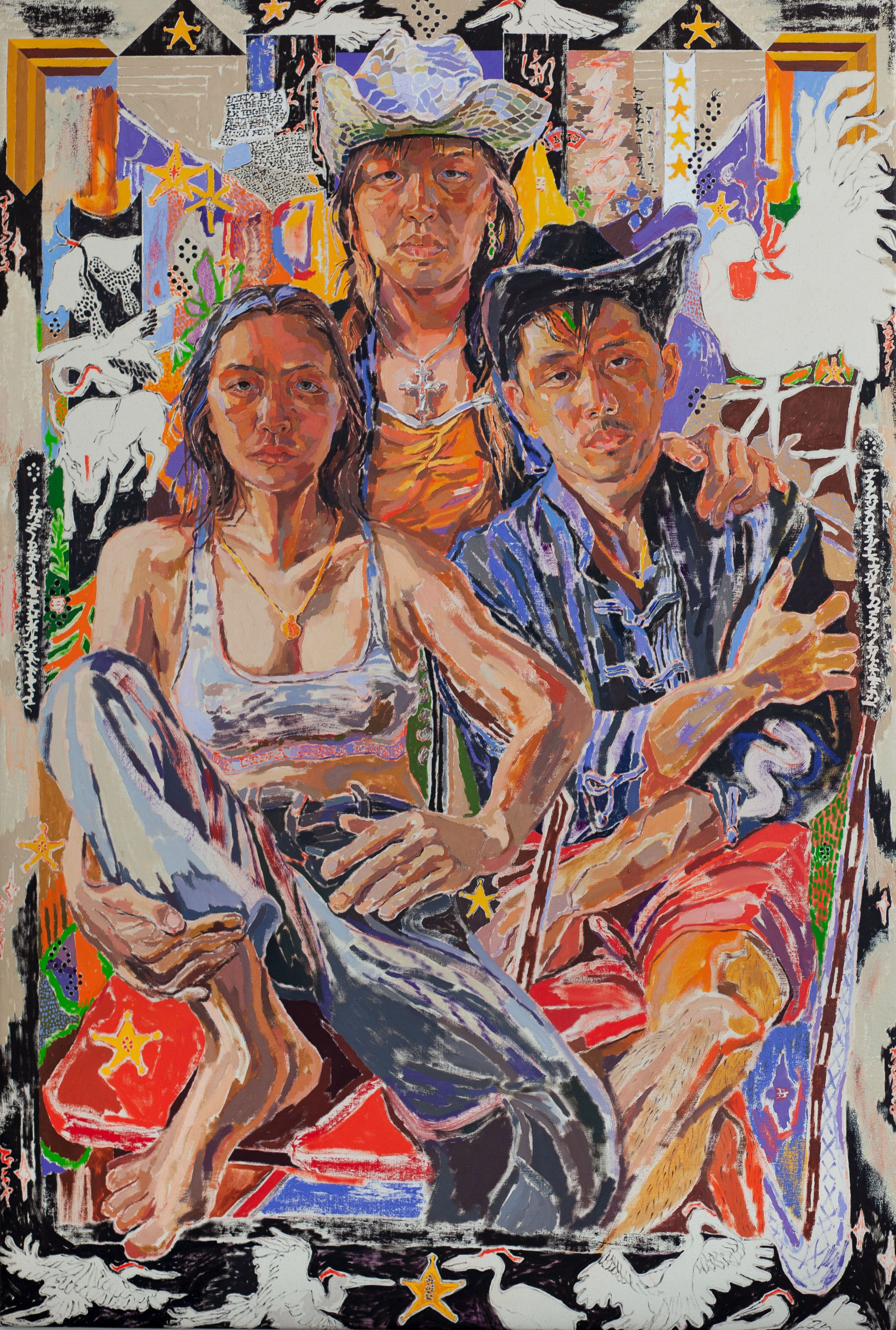
Oscar yi Hou (born Liverpool, UK, 1998). ’birds of a feather flock together, aka: A New Family Portrait,’ 2020. Oil on canvas, 61“ × 43“. Courtesy of Carl Freedman Gallery. © Oscar yi Hou. Photography by Oscar yi Hou.
Yi Hou was gifted from the beginning. Illustrating manga and anime characters was one of his earliest influences and methods for building his technical skills. Without a significant artistic example in his immediate family, he found few role models and little support at home as a budding creative. If not for the small, online community of fan artists he joined in his angsty early adolescence, he shares, it is unlikely that he would have considered studying fine art for his A-levels. Yi Hou himself attributes his first experiences with color theory to Open Art Forum, a Tumblr-like platform where people deeply engaged in various fandoms published their own art. It wasn’t until his A-levels, though, that yi Hou was introduced to the traditions of European avant garde painting, specifically through the works of artists such as Lucian Freud and Van Gogh, which he copied before eventually developing his own personal style. Yet even as he excelled and his prospects of becoming a professional artist skyrocketed, yi Hou’s hardworking parents, who operated a Chinese restaurant in Liverpool for nearly thirty years, discouraged him from pursuing art professionally when he set his sights on studying abroad in the United States for college. Still, the artist remained hardworking, persistent, and—most importantly—self-assured enough to turn his natural talent into something greater.
Ten years, a scholarship, and an international move later, yi Hou is a considerably successful full-time artist and poet. At just twenty-four years old, he is represented by James Fuentes Gallery and won the prestigious UOVO Prize last year, which allowed him to step back from his typically busy schedule to prepare for the largest exhibition of his career to date: a solo showing of recent paintings now on view at the Brooklyn Museum. An opportunity of this caliber hardly ever comes along for early-career artists, but for yi Hou, it is clear that the accomplishment is hard-earned.
“I cannot fail. I have to succeed,“ he says. Coming of age in a family where there is a significant pressure to be financially independent at a young age tends to leave such an impression, even for those who have managed to obtain such critical acclaim in their youth. It’s a humbling reality for those who don’t come from immense privilege; you have to find some way, any way, to do what you love while also providing for yourself, all while remaining true and authentic to your desires. This pressure is significantly more consequential for those who, like yi Hou, need to work to maintain legal status as an immigrant in the United States. The pressure to be financially independent, he says, greatly influences his productivity and, as a result, may be partially responsible for his early success: “People who come from artistic backgrounds or who have a larger safety net don’t have to professionalize so early on and they are able to explore their interests more.“ Though he doesn’t feel “pigeonholed“ by his medium of choice, he adds, “it’s always been something I’m conscious of.“
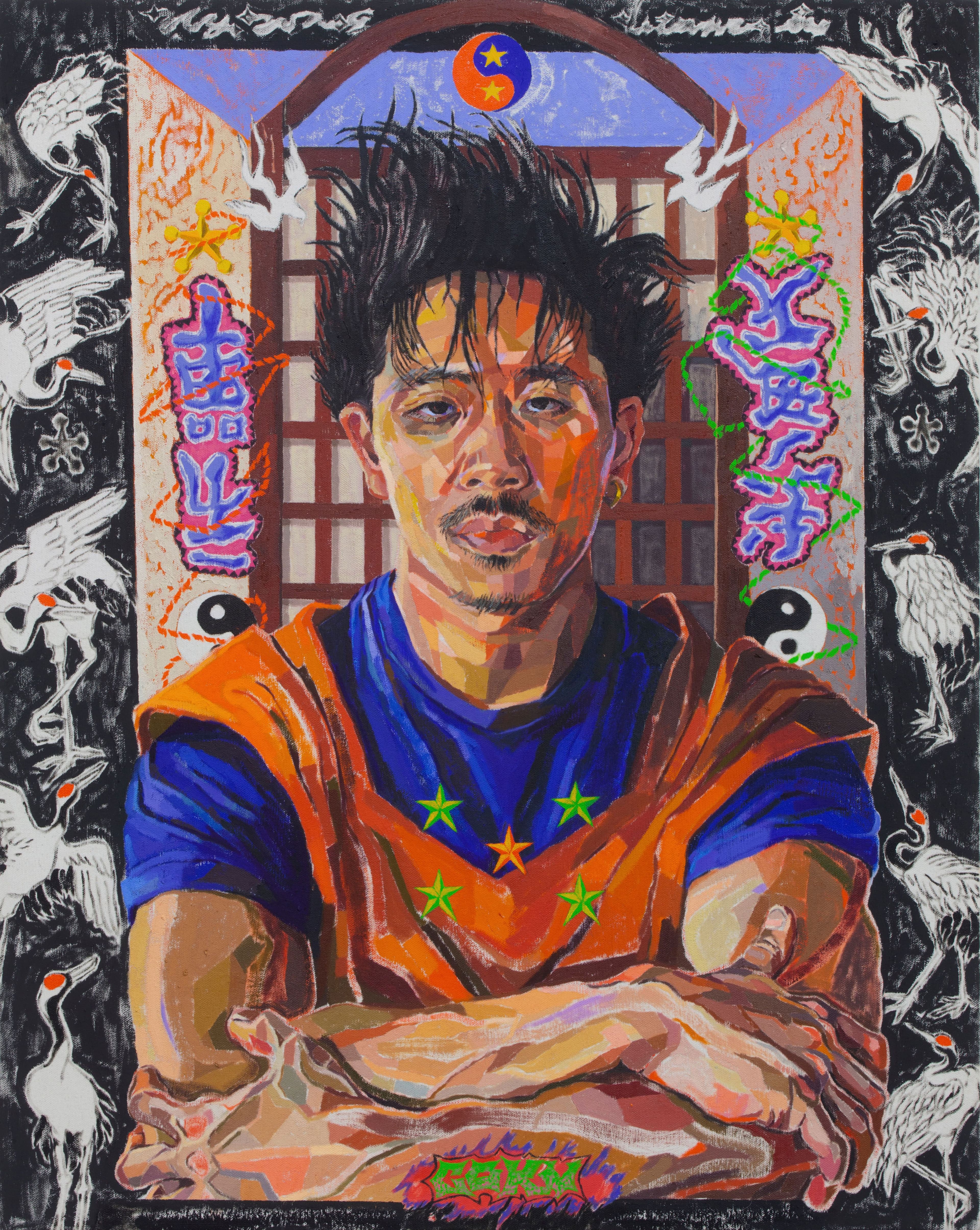
Oscar yi Hou (born Liverpool, UK, 1998). ’Coolieisms, aka: Sly Son Goku turns 23,’ 2021. Oil on canvas, 30“ × 24“. Courtesy of James Fuentes LLC. © Oscar yi Hou. Photography by Jason Mandella, courtesy of James Fuentes LLC.
If there is one word to describe yi Hou, it would be conscious. The artist is acutely aware of the world around and beyond him, deeply engaged in the pursuit of knowledge and diverse perspectives. Places and people inform his identity as a person and a painter. Despite his immediate family’s original lack of enthusiasm for his creative pursuits, yi Hou recalls his adolescence with tender reverence. In Liverpool, with its buzzing nightlife, he came of age during countless nights with friends who served as inspiration for his earliest paintings. “I’ve always been super interested in painting people, my environment, and the people around me,“ he says. In 2016, he landed in New York City, with its diverse, queer, and contradictory universe, to attend Columbia University and study visual arts. He says he plans to remain, pointing to the city as a source of infinite creative inspiration, as well as a safe haven for the subjects he gravitates towards. “A lot of the people I am painting are minorities, they’re queer, they’re people of color,“ he points out.
In a press release for his 2021 exhibition “A sky-licker relation,“ yi Hou’s work is described as “representing the being-with of a queer lifeworld.“ For him, painting diverse subjects is about visualizing a coalitional politics where the goal is to find similarities between people, despite their differences. “There’s always a pressure placed on minority artists from the larger community to be a ’good’ spokesperson, to represent the community in the best way,“ he says. This demand almost always involves a flattening—an obfuscation of nuance and individual experiences which can often lead to a palpable dissonance between the artist and the art they present to the world. To counteract this tendency, yi Hou chooses to represent those he is in community with, rather than adopting the traditionally hierarchical viewpoint of Western painters that typically positions their subjects as social others, categorically separate from themselves.
How, though, does such an intention evolve throughout an artist’s career in a single medium without succumbing to a pattern of repetition? Perhaps yi Hou’s most recent body of work—a series of ambitiously large-scale portraits peppered with abstract symbolism and informed by deeply theoretical and political themes—serves as an example for young artists contemplating such a path, which ultimately privileges an honest translation of their individual way of seeing, interpreting, and translating the world around them. “A lot of my work is mobilized by the different academic texts I’ve read,“ yi Hou says. “A sky-licker relation,“ for example, takes its name from a book called Racial Castration: Managing Masculinity in Asian America by David Eng, which explores the intersection of sexuality and gender identification in constructing Asian-American masculinities. In incorporating theoretical and historical writing as a central part of his practice, yi Hou positions himself within a lineage of critical and generative thinkers, poised to transform our collective understanding of the world in which we live. He encourages viewers to rethink the way they engage with identity through group stereotypes and other limiting characterizations constructed by our perceptions of others.
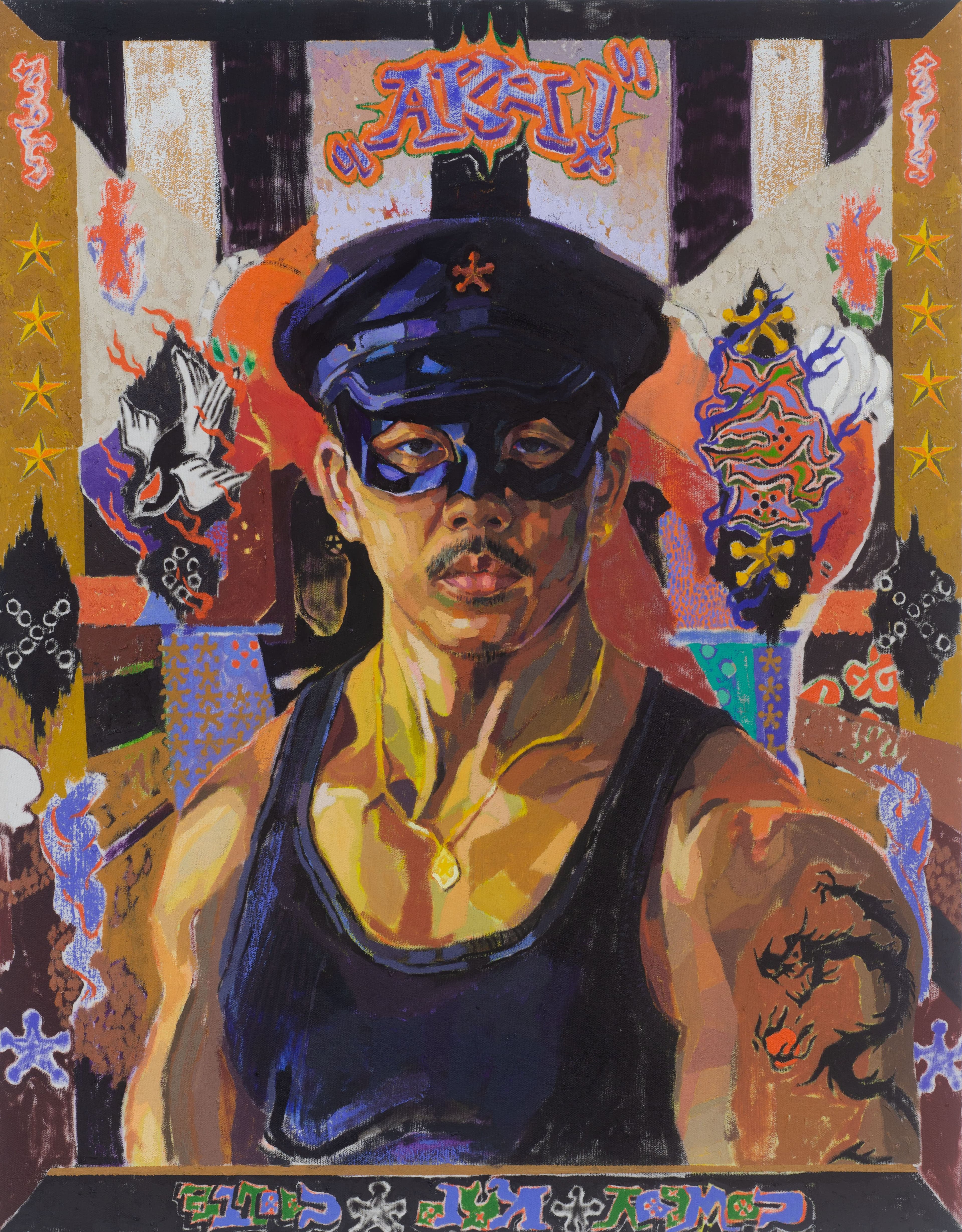
Oscar yi Hou (born Liverpool, UK, 1998). ’Cowboy Kato Coolie, aka: Bruce’s Bitch,’ 2021. Oil on canvas, 28 1⁄8“ × 22“. Courtesy of James Fuentes LLC. © Oscar yi Hou. Photography by Jason Mandella, courtesy of James Fuentes LLC.
Upon first encounter with yi Hou’s paintings, some critics might misinterpret the artist’s investment in portraiture as counterintuitive to his voiced commitment to nuancing representations of those in his community. However, his dedication to honoring his sitters’ “right to opacity“—a concept borrowed from Martinican post-colonial theorist Édouard Glissant—through the development of a complex matrix of symbols like five-pointed stars, yin and yang, masks, and screens that serve to both illustrate and obfuscate the identity of his subjects, is indeed an act of protection. “My work is pretty accessible. They are [legible] portraits—but upon further glance the subjects are unknowable, because the meaning [of these symbols] is also hidden and unknowable,“ he explains. “That’s what I mean when I talk about the unknowable subject: how you paint someone—represent someone—but at the same time, keep them hidden. You don’t expose all of them.“
While they reinterpret traditional symbols historically referenced in European painting, yi Hou’s works are also intended to engage with their contemporary meanings developed within the digital realm. The symbols and language fragments used in many of his paintings mirror digital code, thus encrypting his subjects’ intimate “data“ as a security measure. “We need to be okay with the unknowability of the other,“ he suggests. “Knowing is historically a negative thing—practices like craniometrics and eugenics, the idea that you can fully know [a group of people] if you are able to quantify or translate them, is of course bullshit! You can’t ever fully know the abstract ’thing’ that is human life.“ In truth, yi Hou says, he is constantly inspired by the inscrutability of others. “It’s often that gap of unknowability, between two languages or two different cultures, that is the most poetic.“
“Oscar yi Hou: East of sun, west of moon“ is on view through September 17 at the Brooklyn Museum. Read this story and many more in print by ordering our fifth issue here.
As a nonprofit arts and culture publication dedicated to educating, inspiring, and uplifting creatives, Cero Magazine depends on your donations to create stories like these. Please support our work here.
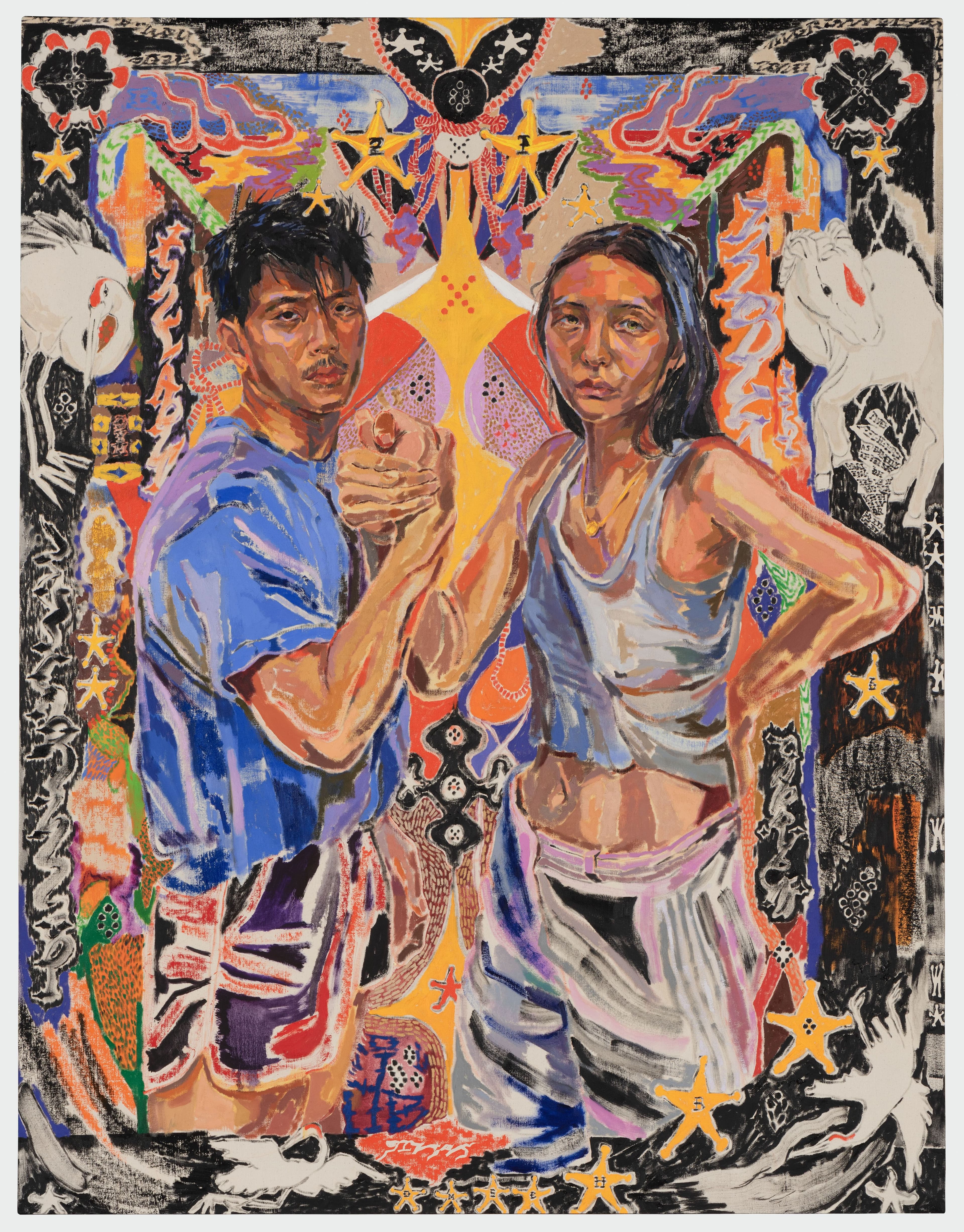
Oscar yi Hou (born Liverpool, UK, 1998). ’The Arm Wrestle of Chip & Spike; aka: Star-Makers,’ 2020. Oil on canvas, 55 1⁄2“ × 43“. Brooklyn Museum; Purchase gift of Scott Rofey and Olivia Song, 2021. 45. © Oscar yi Hou. Photography by Jason Mandella, courtesy of James Fuentes LLC.
As a nonprofit arts and culture publication dedicated to educating, inspiring, and uplifting creatives, Cero Magazine depends on your donations to create stories like these. Please support our work here.






